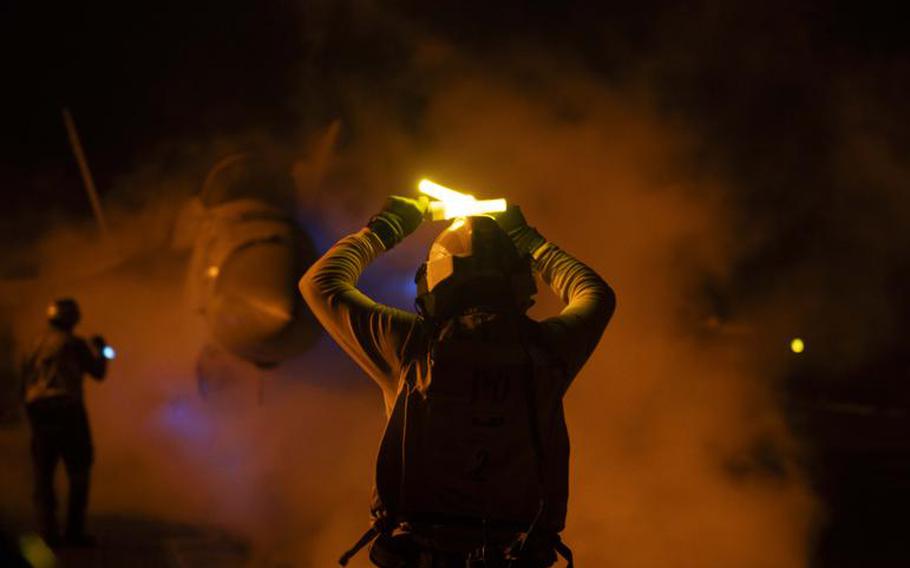Middle East
‘It will continue:’ US launches strikes in Syria, Iraq in retaliation for 3 soldiers killed by Iran-backed militants
Stars and Stripes February 2, 2024

The USS Dwight D. Eisenhower conducts flight operations on Jan. 22, 2024, in response to increased attacks by Iranian-backed Houthi militants in the Red Sea. (Kaitlin Watt/U.S. Navy)
WASHINGTON — The U.S. military began airstrikes in Iraq and Syria on Friday in response to a drone attack Sunday in Jordan that killed three American soldiers, U.S. defense officials said.
The strikes began at about 4 p.m. ET against Iran’s Islamic Revolutionary Guards Corps and affiliated militia groups, striking seven facilities, defense officials said. National Security Council spokesman John Kirby told reporters Friday that three facilities were hit in Iraq and four in Syria.
When plans were designed for the operation, weather was a factor in the timing, said Army Lt. Gen. Douglas Sims, director of the Joint Staff.
“Good weather presented itself today and, as a result, this took place,” he said.
Sims said it was too early to provide a battle-damage assessment, but the initial indication is the U.S. struck what it intended to hit, with several secondary explosions.
“U.S. military forces struck more than 85 targets, with numerous aircraft to include long-range bombers flown from [the] United States. The airstrikes employed more than 125 precision munitions,” according to U.S. Central Command, which is responsible for American military operations in the Middle East.
The strikes involved B-1 bombers and the attacks took 30 minutes, Kirby said. Some of the facilities attacked include command-and-control operations centers, unmanned aerial vehicle storages and logistics and munition supply chain facilities.
President Joe Biden and Defense Secretary Lloyd Austin vowed the strikes would continue in retaliation for the Army reservists’ deaths.
“Our response began today. It will continue at times and places of our choosing,” Biden said in a statement issued shortly after the attacks. “The United States does not seek conflict in the Middle East or anywhere else in the world. But let all those who might seek to do us harm know this: If you harm an American, we will respond.”
Austin, in a separate statement, said forthcoming attacks would also “hold the IRGC and affiliated militias accountable for their attacks on” U.S. and coalition troops in the region.
“The president and I will not tolerate attacks on American forces,” Austin said. “We will take all necessary actions to defend the United States, our forces, and our interests.”
Joe Biden watches as an Army carry team moves the transfer case containing the remains of U.S. Army Sgt. Kennedy Ladon Sanders at Dover Air Force Base, Del., on Feb. 2, 2024. (Matt Rourke/AP)
The assault came shortly after Biden and Austin joined the grieving families of the fallen soldiers at Dover Air Force Base, Del., to honor them as their bodies were returned to the United States.
Kirby said Wednesday that the U.S. believes the attack was planned, resourced and facilitated by the Islamic Resistance in Iraq, an umbrella group that includes the militant group Kata’ib Hezbollah.
Kirby and Austin said this week that the potential strike will be a multi-tiered response.
“I don’t think the adversaries are of a one and done mindset. And so they have a lot of capability. I have a lot more,” Austin told reporters Thursday.
While the strikes were welcomed by some Republican lawmakers, at least one criticized Biden’s decision to wait “far too long” to retaliate — nearly one week after the deadly attack in Jordan.
“Iran and its proxies have tried to kill American soldiers and sink our warships 165 times while the Biden administration congratulates itself for doing the bare minimum,” Sen. Roger Wicker of Mississippi, the top Republican on the Senate Armed Services Committee, said in a statement after the assault began Friday. “Instead of giving the Ayatollah the bloody nose that he deserves, we continue to give him a slap on the wrist.”
Wicker accused the Biden administration of “foolishly telegraphing” its strike plans this week and giving Iranian and militia leaders in Iraq and Syria “time to relocate and hide.”
However, Sen. Jack Reed, D-R.I., chairman of the Armed Services Committee, countered that the strikes were a properly planned, “strong and proportional response” to the militia attack earlier in the week.
“Iran’s proxy forces in Syria and Iraq have been dealt a significant blow, and Iranian-linked militias around the Middle East should understand that they, too, will be held accountable,” Reed said in a statement. “These strikes, in concert with wise diplomacy, send a clear signal that the United States will continue to take appropriate action to protect our personnel and our interests.”
Sgt. William Jerome Rivers, Spc. Kennedy Ladon Sanders and Spc. Breonna Alexsondria Moffett were killed in the strike on the small base in northeast Jordan known as Tower 22. The soldiers were assigned to the 718th Engineer Company, 926th Engineer Battalion from the 926th Engineer Brigade based at Fort Moore, Ga.
All three soldiers were part-time citizen-soldiers from Georgia. Rivers, 46, was from Carrollton. Sanders, 24, was from Waycross in south Georgia near the Okefenokee Swamp. Moffett, 23, was from Savannah.

The three U.S. Army Reserve soldiers killed by a drone strike in Jordan: from left, Sgt. William Jerome Rivers, Spc. Kennedy Ladon Sanders and Spc. Breonna Alexsondria Moffett. (U.S. Army)
Rivers was posthumously promoted to staff sergeant Friday, the Army said. Sanders and Moffett were promoted Tuesday to sergeants.
The drone struck Tower 22, a logistics support base in Jordan along the Syrian border, where U.S. forces support the decade-old Operation Inherent Resolve, a mission to ensure the defeat of Islamic State.
Approximately 350 Army and Air Force troops are deployed to the base, according to CENTCOM.
An investigation was ongoing into how the drone was able to evade U.S. air defenses used to protect forces on the Jordan base, the Pentagon has said.
At least 41 other soldiers — all in the National Guard — were injured in Sunday’s attack. The injured soldiers are from units based in Arizona, California, Kentucky and New York. Twenty-seven were able to return to duty, while 14 others continue to be evaluated for follow-up care, including one in stable condition who required medical evacuation from Jordan.